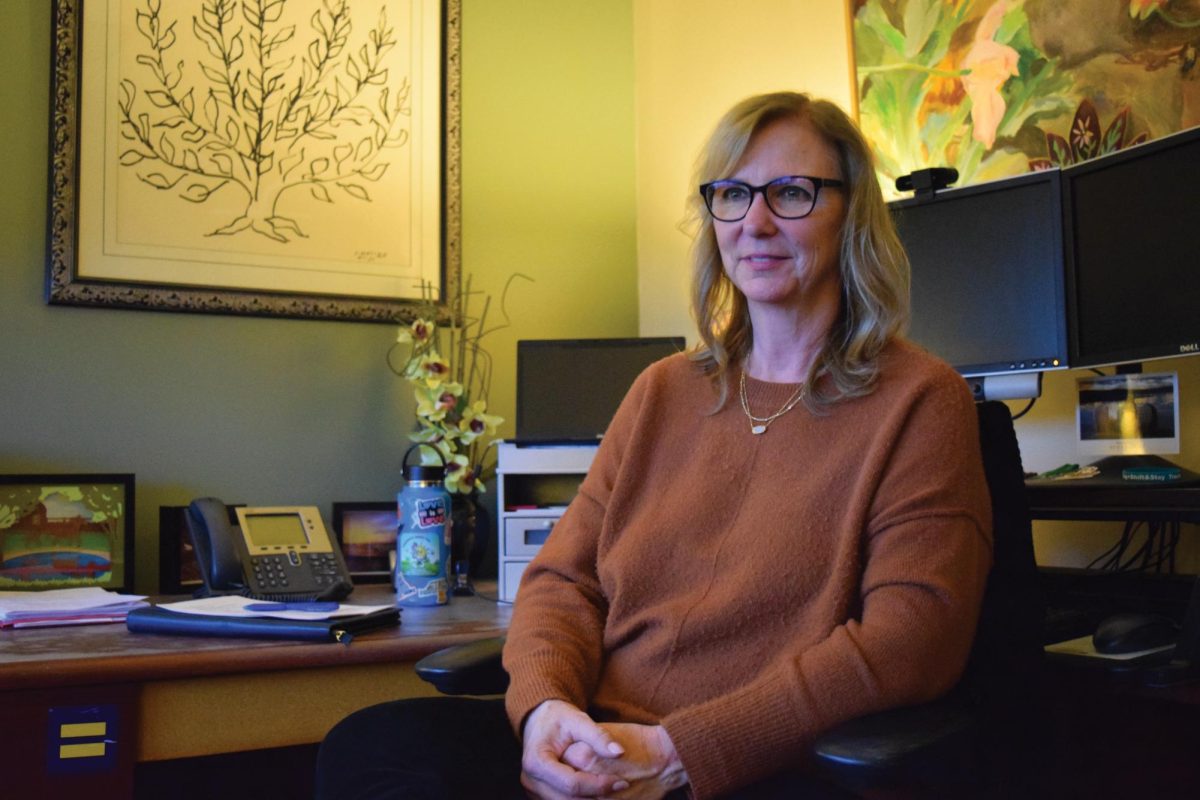Colleges were shutting down across the country amid COVID-19’s rapid spread in 2020, and California State University, Northridge students needed support in a manner yet explored on campus. Amid the closures, University Counseling Services did not shutter for a single day. They opened their virtual doors to students to talk through the global event both one-on-one and in groups of their peers. UCS has maintained accessible support since with a large and diverse staff, each with a unique passion for their work.
UCS offers a range of services, including short-term counseling, specialized group therapy and Let’s Talk sessions across campus to introduce students to therapy and their options. The numerous kinds of services were designed to give students many mediums of care in hopes at least one would click.
While all counselors are generalists, meaning they can assist students in all situations, UCS has a variety of liaisons who specialize in certain demographics. Students are able to meet with counselors in person and over the phone, which is an option introduced during the lockdown.
Accessibility is key. Students are served whether they are stuck at home to avoid a virus or to take care of a newborn, and telehealth was implemented when the former became mandatory, as shared by Dr. Julie Pearce, the director of UCS.
“We needed to be available to our students,” said Pearce. “We did not close for one day, and I am really proud of us for that.”
The team conducted sessions with students over the phone until they gained access to laptops and a version of Zoom compliant with federal medical privacy laws.
During the lockdown, many students were forced to return to households they did not feel comfortable in, and the LGBTQIA+ group sessions doubled to accommodate students seeking community.
“Students wanted that connection with each other,” said Pearce.
With lockdown in the rear view, UCS continues to offer telehealth services alongside in-person sessions. In the four years since the start of the pandemic, the staff grew larger than their office space in Bayramian Hall could fit, so their counselors have hybrid schedules to be able to meet as many students as possible.
Outside their Bayramian home, counselors host Let’s Talk sessions to bring therapy to various hubs on campus.
Let’s Talk originated at Cornell University, and Pearce brought the idea to CSUN after learning about it at a conference. Let’s Talk gives students an informal setting to meet counselors and learn about the variety of resources available to them on campus, including UCS.
Staff counselor Dr. Marlon James Briggs hosts the Let’s Talk sessions at the Black House, where he is open to any student who wants to inquire about mental health. Hosting the sessions at places like the Black House helps meet students where they are, and lets them speak without paperwork. At other venues, including the Glenn Omatsu House, Pride Center and more, counselors have a confidential space where they can meet with students privately and get to know them.
“If after, you’re like, ‘No, this whole talking thing ain’t for me,’ OK, but know we’re here,” said James Briggs. “If it’s like, ‘Yeah, let me make an appointment,’ then let’s do that. Let’s see if we can keep this help going.”
James Briggs, a double CSUN graduate, has experience working in a domestic violence shelter and an interest in grief and loss. He hosts a grief and loss group once a semester with a schedule based on students’ needs to make it as accessible as possible.
“Grief is associated with love,” said James Briggs. “The reason that we grieve is because we had a relationship with that person, that place, that situation.”
When students meet counselors, they are able to see that therapists are human. James Briggs fights back against preconceived notions of intimidating white coats.
“I am just another person who happens to be trained in how to listen,” said James Briggs.
His sentiments are mirrored by staff counselor Dr. Paulette Theresa-Schechtel.
“It’s important for our students to see us as regular people,” said Theresa-Schechtel.
She also encourages students to connect with each other, which inspired her to originate Sistahood and WISDOM. Both were started to bring Black female students together with the latter focusing on mentor relationships.
“When you give someone a sense of who they can be … it opens them up and gives them a sense of ‘Oh, I can do that too,’” said Theresa-Schechtel.
In both counseling and mentoring relationships, she stressed the importance of vulnerability to build trust.
“Because I am human, there are going to be times when I make a mistake. When I do, I have to own it,” said Theresa-Schechtel. “The client then gets to see me as a human being, as opposed to someone who is intimidating or someone who is above them, because that is not what therapy is about.”
Dr. Seung Yoon Lee, a postdoctoral counselor fellow at UCS, notes students from varying countries, including South Korea, see therapists as authority figures, which can keep them from sharing freely.
“It is not something you can just get rid of because you are in the U.S.,” said Lee.
Coming from a culture heavily influenced by respect, Lee understands the hesitation and brings it up in sessions.
“The power difference is like an elephant in the room,” said Lee.
Her approach to dispel the imbalance is to address it and let students know she understands.
Because she grew up outside of the United States, Lee is aware of cultural differences between people from other countries, including behavioral customs, colloquial sayings and more. Each session is a learning experience for Lee, which she applies to her practice moving forward.
“Having all this marginalized identity really kept me humble and curious,” said Lee. “There is always a lot of room for me to explore.”
Another way Lee puts students at ease is speaking Korean with those who might feel more comfortable sharing their feelings in their mother tongue.
“It’s helpful for them to express themselves,” said Lee. “They can just be themselves, they don’t have to try hard.”
UCS has a number of counselors who speak multiple languages, including Spanish, Tagalog and Russian. There is also a counselor who can conduct sessions in American Sign Language.
The multicultural aspect of UCS gives students resources in which they see themselves reflected. As a former international student, Lee understands the value of mental health care for students from different backgrounds.
“When I look back, I could have gotten a lot of help,” said Lee. “It could have changed my trajectory if I had some help and support from counseling services.”
Students interested in UCS can schedule appointments with specific counselors or be placed with counselors by availability, and first appointments are all scheduled within two weeks to make sure students are seen, as explained by the director. UCS also has walk-in urgent care Monday through Friday from 8 a.m. to 5 p.m. in Bayramian Hall 520.
“We know it is hard for students to ask for help,” said Pearce. “We want to make it as easy as possible.”
Seeing a student’s improvement and success in their university journey is the best feeling as a care provider for her.
“That’s the biggest reward,” said Pearce. “Being out there at graduation and seeing students who we knew almost weren’t going to stay.”



